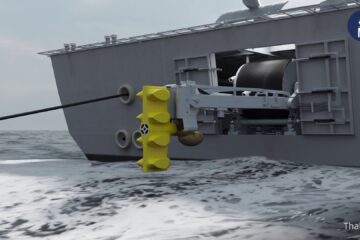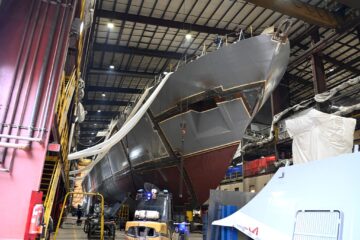Story by Richard Scott with additional reporting by Xavier Vavasseur
The decision to procure CAPTAS-4 – which is being supplied to shipbuilder Fincantieri Marinette Marine (FMM) through Thales-owned Advanced Acoustic Concepts – came after the US Navy decided to end development of the Raytheon AN/SQS-62 Dual-mode Array Transmitter (DART) VDS, and cancel the anti-submarine warfare (ASW) mission module originally intended to equip the Littoral Combat Ship. Cancellation of the ASW mission module was confirmed to Naval News by the Commanding Officer of LCS 23 during our recent visit to Naval Station Mayport, Florida.
DART encountered reliability and performance issues during its development, leading the navy and FMM to consider a proven alternative VDS for the FFG-62 program. The selection of CAPTAS-4 – the largest and most powerful member of the CAPTAS family of low-frequency active/passive sonars – means that the US Navy becomes the 14th customer navy for the CAPTAS line.
During a 29 August 2022 roundtable at the Pentagon to coincide with the start of fabrication on CONSTELLATION FFG 62, our colleague Chris Cavas brought up the decision to switch from the Raytheon DART sonar to the Thales CAPTAS-4 to Rear Admiral Casey Moton, NAVSEA Program Executive Officer, Unmanned and Small Combatants:
“So the plan for frigate had been to go with the DART sonar, the Raytheon product that had been selected for LCS. [Dual-mode Array Transmitter AN/SQS-62 VDS] And that was a plan that was driven by the desire for commonality between the two classes in conducting a study. [LCS and FFG].
As you know, as the work proceeded with the Raytheon sonar, there were some technical challenges that arose principally in the area of hydrodynamics in that sort of stability flowing through the water of the of the array. And also some issues with transducers, both in reliability and performance.
[…]
So eventually it just came to the point where the risk had [grown] so much. And then we had some testing in September 2021 that caused us to have increased concern that we were not going to be able to solve the issues with the Raytheon sonar. [testing was paused at that time]. So we, you know, the shipbuilder had concerns, we certainly had concerns, and we made the hard decision to stop that effort and to switch frigate to the CAPTAS. But I still certainly think that that was the right decision.
[…]
It is a sonar that’s fundamentally got the pedigree of the one that was actually I think you were referring Chris, that was in testing a few years ago on LCS. The CAPTAS is actually also fielded off of our FREMM-class frigates, and so we’re quite familiar with it as well. We looked at the integration aspects and made that decision in concert with the ship order. And I think it’s going to prove to be a good choice. And I think CAPTAS is going to have a great ASW capability to frigate when it delivers.”
Naval News understands that the first system is already in production at the Thales site in Brest, Brittany. Thales will build and integrate the first two VDS systems in France to meet in-yard delivery dates of 2023 and 2024 for the future USS Constellation. Follow-on systems will be integrated in the United States. A total of 10 VDS are set to be ordered. CAPTAS-4, which uses a four-ring active towed body, will operate in conjunction with the AN/SQQ-89(V)15 undersea warfare suite and the TB-37 Multi-Function Towed Array.

CAPTAS-4 already equips the FREMM frigates operated by France, Italy, Morocco, and Egypt, while the Sonar 2087 system – which also uses the CAPTAS-4 towed body and handling system – is fitted to Type 23 frigates serving with the Royal Navy and the Chilean Navy.
The latest CAPTAS-4 Compact system – which significantly reduces the weight and footprint of the handling system – has already been selected by three navies. The FDI ships being built by Naval Group for France and Greece are to receive an independent tow variant separate active towed body and passive receive array; Spain’s new F110 frigates, being built by Navantia, will be equipped with a dependent tow version in which the receive array is attached to, and deployed with, the towed body on a single tow line.
We interviewed AAC during SNA 2023 about the CAPTAS-4 sonar for the US Navy:






